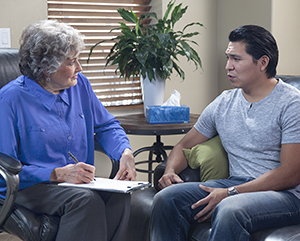Panic disorder, also known as panic attacks, doesn't have to be endured alone. Effective treatment choices exist. Therapy, or counseling, plays a big role in managing panic disorder. With the help of a skilled therapist, you can confront your anxiety and develop ways to cope with them. Therapy can range from short-term to long-term depending on your needs. Medicine might also be recommended along with therapy in certain cases. It may take time to feel the benefits of therapy. But sticking with the treatment will help you feel better.
Cognitive behavioral therapy (CBT)
Cognitive behavioral therapy (CBT) teaches you to manage anxiety that can lead to panic attacks. It does this by helping you understand how you think and act when you’re anxious. Research shows CBT to be a very effective treatment for panic disorder. CBT is run almost like a class. It involves homework and activities to build skills that teach you to cope with anxiety step by step. It can be done in a group or one-on-one. It often takes place for a set number of sessions. CBT has 2 main parts:
-
Cognitive therapy helps you identify the negative, irrational thoughts that occur with your anxiety. You’ll learn to replace these with more positive, realistic thoughts.
-
Behavioral therapy helps you change how you react to anxiety. You’ll learn coping skills and methods for relaxing to help you better deal with anxiety.
Other forms of therapy
Other therapy methods may work better for you than CBT. Or you may move from CBT to another form of therapy as your needs change. This may mean meeting with a therapist by yourself or in a group. Therapy can also help you work through problems in your life. These may include drug or alcohol dependence that may be making your anxiety worse.
Warning signs for suicide
Panic disorder can be a discouraging, frightening condition that can lead some people to consider self-harm or suicide. It's very important to work with a trusted therapist, take any medicines as prescribed, and get help if you have any of these symptoms:
-
Thinking often about taking your life
-
Planning how you may attempt it
-
Talking or writing about committing suicide
-
Feeling that death is the only solution to your problems
-
Feeling a pressing need to make out your will or arrange your funeral
-
Giving away things you own
-
Doing risky behaviors, such as sex with someone you don't know or drinking and driving
-
Noticing a change in your eating or sleeping patterns
If you see any of these warning signs, get help right away. Call or text 988. This is the 988 Suicide & Crisis Lifeline. You will be connected to a trained counselor you can talk to. There's also an online chat option. You can also call Lifeline at 800-273-TALK (800-273-8255). The 988 Lifeline is free and available 24/7.
To learn more
-
988 Suicide & Crisis Lifeline at www.988lifeline.org or
988 or 800-273-TALK (800-273-8255) -
Substance Abuse and Mental Health Services Administration at www.findtreatment.samhsa.gov or 800-662-HELP (800-662-4357)
-
National Institute of Mental Health at www.nimh.nih.gov or 866-615-6464
-
National Alliance on Mental Illness at www.nami.org or 800-950-NAMI (800-950-6264)
-
Mental Health America at www.nmha.org or 800-969-6642
Getting better takes time
Therapy will help you feel better. It will teach you skills to help manage your panic disorder long-term. But change doesn’t happen right away. It takes a commitment from you. And treatment only works if you learn to face the causes of your anxiety. So, you might feel worse before you feel better. This can sometimes make it hard to stick with it. But remember: Therapy is a very effective treatment. The results will be well worth it.


